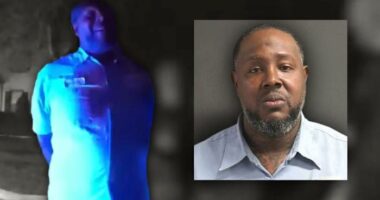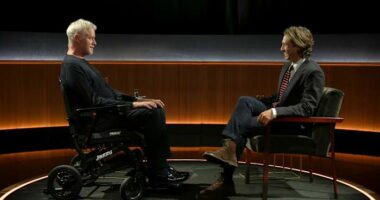Share this @internewscast.com

JOHNSON CITY, Tenn. (WJHL) — Following Johnson City’s $28 million settlement with the alleged victims of serial rapist Sean Williams and as Williams’s criminal proceedings advance, the case that some say initiated these actions has seen little advancement lately — a situation not entirely surprising, according to one local attorney.
“The dynamics unfolding in this situation are quite notable,” attorney Corey Shipley conveyed to News Channel 11 regarding the Dahl v Johnson City lawsuit filed in June 2022 by former Special Assistant U.S. Attorney Kateri “Kat” Dahl.
The standout issues currently impacting the case involve the city’s motion for summary judgment — a standard legal move to establish certain lawsuit elements as irrelevant, sometimes leading to dismissal — and Dahl’s legal representatives’ motion to reopen discovery. Each party has filed documents countering the other’s motions.
Shipley remarked that Williams’s criminal matters and the victims’ civil lawsuit add layers of complexity to Dahl’s case, presenting Judge Katherine Crytzer with challenging decisions. She has yet to deliver a ruling on the pending motions.
“You cannot talk about Kat Dahl’s case without talking about the Sean Williams case,” Shipley said.
At a time when Williams had been wanted for a year on federal ammunition charges without any sex crime charges filed, Dahl took legal action against the city and then-Johnson City Police Department (JCPD) Chief Karl Turner. She claimed her firing was retaliatory, following her demands for a more assertive investigation by JCPD into allegations that Williams was drugging and assaulting women in his Johnson City residence.
The defense for Johnson City argues that Dahl was not a formal employee and that her contract was not renewed due to her failure to meet expectations, specifically not pursuing certain cases to indictment in federal court.
Ten months after Dahl sued, authorities in Sylva, N.C. arrested Williams on drug possession charges, then discovered digital drives in his possession that prosecutors have said show Williams sexually assaulting several children and dozens of women in his apartment. And two months later, some of those adult victims sued the city, alleging that JCPD didn’t adequately investigate complaints against Williams.
As those cases played out in civil and criminal court, information came out of them, including “discovery” in the Does case, that Shipley said could arguably be relevant to Dahl’s case. Some of that discovery and some of the criminal case’s facts have come out after discovery in Dahl’s case officially closed in January 2024.
“You can’t think about one of these cases without looking at the other two,” Shipley said.
“Because of all the other things that have come out, not only in discovery in the Does case and how that was settled, but what came out in trial in the Sean Williams case, going back to some of the claims that are found within Ms. Dahl’s case or at least alluded to … I think that could be a situation that’s causing some time here,” Shipley said.
Will she just throw it out?
A broad summary judgment ruling from Crytzer could leave Dahl’s case effectively gutted, but Shipley said there’s a high bar for arguments that any issues aren’t material.
“The court will ultimately look at it in the light most favorable to the non-moving party,” Shipley said. In this case, that’s Dahl’s side. “They’ll almost always give that party the benefit of the doubt if it’s not very clear there is no genuine issue of material fact for summary judgment.”
Nevertheless, the city’s motion still remains, with the looming possibility that it could be granted in a way that badly damages Dahl’s prospects for success.
“Because the criminal cases in the dockets are so large, that could be one factor,” Shipley said, referring to the busy docket in the Eastern District of Tennessee and the fact that criminal cases often get moved along more quickly.
“But another factor is that this is just such an odd case,” he said. “The issues that she has alleged in her lawsuit really directly relate to the actions that have already been proven in the Sean Williams case. So you can’t bifurcate these lawsuits.”
Will plaintiffs reopen the box?
On the other side, Dahl’s attorneys have claimed several bits of discovery that surfaced in the Does case, and other developments since January 2024, justify allowing them to reopen discovery.
After the defense opposed that motion, Crytzer ordered Dahl’s attorneys to narrow the scope of their ask. Shipley, who has argued multiple civil and criminal federal cases, said he supports that approach from the bench.
“If there is a valid reason that could serve the interest of justice, a judge has to look at that. And I think that’s been a very good ruling by the judge to say, ‘give me a reason, show me why that discovery should be reopened and be specific on it. Because if it’s warranted and it’s valid, then sure, we’ll let you do that. But it’s not going to be a fishing expedition.’ It just can’t be.”
Shipley said he’s not surprised the city’s attorneys have vehemently opposed the motion to reopen discovery. Civil cases require only a “preponderance of the evidence” for one side to prevail, as opposed to criminal cases in which a defendant must be proven guilty “beyond a reasonable doubt.”
Shipley said that may have worked in the Jane Doe attorneys’ favor as they built a mountain of circumstantial evidence based on massive amounts of discovery. While there may not have been a smoking gun proving the JCPD was guilty of the allegations against it (including corruption), ultimately, the city settled the case for $28 million without a trial.
“Maybe some of the stuff that’s come out that the plaintiffs want to go further into may not be good for them,” Shipley said of the defense.
“The terrible facts that were proven in the criminal trial and some of the things that were not necessarily proven in the Does case, but talked about in some of the reports and some other things, that was very damaging to those parties.”
By the same token, Shipley said, Dahl’s attorneys probably want access to as much discovery as they can get.
“For the most part, you want to have as much proof as you can, especially to take that beyond the 50-yard line,” he said. “You want to take it as far as you can. But alternatively, as the defense … if there is proof out there, you want to limit that because, you hate to refer to it as percentages, but it really is, because if you’re the defense and you can disallow the plaintiff to prove his or her case by more than 50%, you win.”
Shipley said all the moving parts complicate the job for Crytzer, who was appointed to the bench several years ago.
“If all these other cases that are going on, you can’t leave the case open forever,” Shipley said. “But you want to make sure that the parties that are going to trial both get a fair shake, and both parties can present their case to the best of their abilities.
“The judge, it’s an interesting balance because you have to be able to see a case to its closure, but you also want to make sure that that case is closed effectively, and making sure it’s closed fully, and both parties have had the opportunity to go in and try their case appropriately.”
The case was most recently set for trial last September. That was postponed and a new date has not been set.









